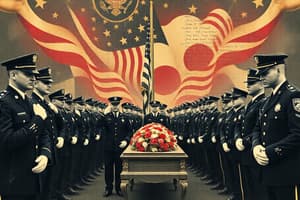Podcast
Questions and Answers
What is disorderly conduct?
What is disorderly conduct?
- Engaging in conduct to impede funeral processes (correct)
- Having a loud party during a funeral
- Pushing people away from a ceremony
- None of the above
What is a funeral procession?
What is a funeral procession?
Two or more vehicles accompanying the remains of a deceased person led by law enforcement or funeral director.
In a procession, the operator proceeding in the same direction shall not _____ except on a highway marked for two or more lanes.
In a procession, the operator proceeding in the same direction shall not _____ except on a highway marked for two or more lanes.
pass
A beneficiary of a life insurance policy has a legal duty to spend that money on funeral debts.
A beneficiary of a life insurance policy has a legal duty to spend that money on funeral debts.
What is the minimum burial depth?
What is the minimum burial depth?
Who must witness disinterment?
Who must witness disinterment?
How long in advance must a party give notice for removal of graves?
How long in advance must a party give notice for removal of graves?
How many members are on the board of funeral service?
How many members are on the board of funeral service?
Board members for funeral service receive pay for their service.
Board members for funeral service receive pay for their service.
What is the purpose of embalming?
What is the purpose of embalming?
A funeral establishment must have a _____ manager.
A funeral establishment must have a _____ manager.
Match the following terms related to funerals:
Match the following terms related to funerals:
Flashcards are hidden until you start studying
Study Notes
Disorderly Conduct
- Defined as engaging in actions that disrupt any funeral, memorial, or family processional, including military funerals.
- Prohibits displays or speeches containing hate language within 300 feet of the site one hour before and after the event.
Funeral Procession
- Consists of two or more vehicles carrying a deceased person, led by law enforcement or a funeral director with flashing lights.
- Vehicles must travel on the right side of the road.
In a Procession
- Drivers must not pass unless on a highway with two or more lanes for moving traffic.
Provision of Life Insurance
- Licensed funeral directors or employees may inquire about the provision of life insurance using a death notification or written authorization from a legal representative.
Beneficiary Obligations
- A beneficiary of a life insurance policy is not legally required to use the funds for the deceased's funeral expenses.
Minimum Burial Depth
- Requires burial vaults or encasements to be at least 18 inches below the ground surface.
- Exceptions exist for mausoleums or family-owned cemeteries established before January 1, 1989.
Removal of Graves
- The state of North Carolina may remove graves as necessary for governmental duties.
- Churches may remove graves to construct or expand facilities.
Electric Power Company
- May remove graves if it owns land designated for use as a reservoir.
Notification for Grave Removal
- A party disinterring graves must notify the next of kin 30 days in advance, using proper procedures and publishing notices.
Witnessing Disinterment
- Disinterments must be witnessed by a licensed funeral director or appropriate officials, including local health directors.
Board of Funeral Service
- Composed of nine members, with appointments including recommendations from funeral director associations and the general assembly.
- Members serve staggered three-year terms.
Definitions of Burial
- Burial encompasses interment in any form, cremation, and transportation of dead human bodies.
Chapel
- Defined as a facility dedicated to the repose of dead human bodies, separate from funeral establishment premises.
Dead Human Body
- Includes fetuses beyond the second trimester and cremation ashes.
Embalming
- Involves preservation and disinfection of bodies using chemicals but excludes simple washing or religious preparations.
Funeral Directing
- Engages in all aspects of funeral service except embalming.
Funeral Director
- Any individual involved in funeral directing services.
Funeral Establishment
- Premises used for the care, arrangement, and preparation of dead bodies for public funeral services.
Funeral Service
- Refers to the collective duties of funeral service licensees in response to death.
Board Positions
- Key officers include a president, vice president, and secretary, serving for one year without pay; reimbursement for expenses is possible.
Board Inspections
- Inspections may occur during business hours, including slightly before or after.
Inspector Requirements
- Must be a licensed funeral service professional.
Licensee Qualifications
- Candidates must be 18+, possess good moral character, graduate from an approved funeral directing program, and pass necessary examinations.
Continuing Education
- A requirement of five hours of continuing education annually, with excess hours permitted to carry over.
Burial Transit Permit
- Required for any body leaving the state.
Permit Exemptions
- Certain professionals and immediate family members are exempt from permit requirements for body removal.
Transporter Requirements
- Must be over 18, have a valid driver’s license, and proof of liability insurance, along with good moral character.
Transport Vehicle Regulations
- Vehicles used for transport must be covered or secured to prevent public view and must not allow photography without permission.
Transport Violations
- Penalties include a $5,000 fine or revocation of transport privileges for infractions.
No Transport Permit
- Classified as a Class 2 misdemeanor.
Permit Display Requirement
- All funeral establishments are required to display a valid permit.
Funeral Manager Mandate
- Each funeral facility must have a licensed manager.
Embalming Establishments
- Must be officially registered.
Preparation Room Standards
- Every establishment must have a private prep room that meets strict hygiene and equipment standards.
Access to Prep Room
- Restricted to licensees, authorized personnel, and certain legally permitted individuals.
Ownership Licensing
- At least one owner of a funeral establishment must hold a valid license.
Studying That Suits You
Use AI to generate personalized quizzes and flashcards to suit your learning preferences.




